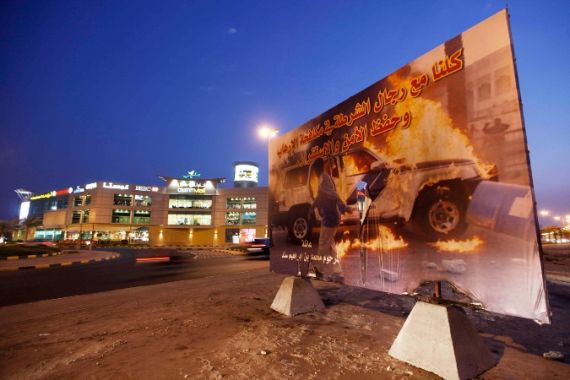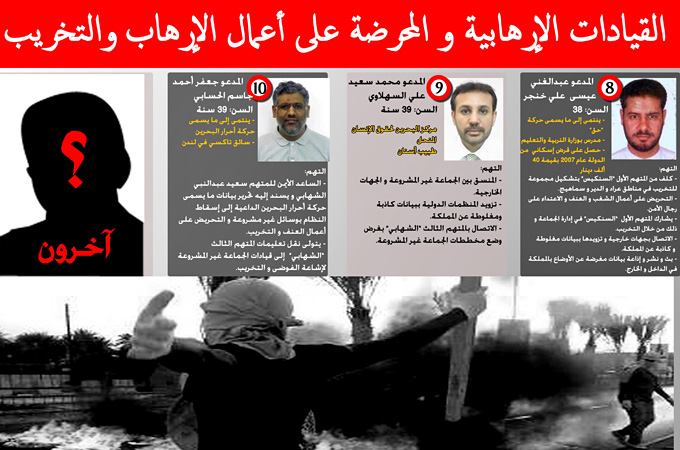Shia crackdowns in Middle East
Two Shia figures in Kuwait and Bahrain are stripped of their citizenships as Shia crackdowns spike in the region.

 |
| Officials in Bahrain say that the arrested Shia activists are terrorists [EPA] |
As Mahmoud Ahmadinejad, the president of Iran, addressed the UN General Assembly in New York amid waves of protests against his country’s human rights track record and nuclear programme, the fabric of a longer standing conflict continues to be woven in the Middle East.
Indeed, his speech on Tuesday seemed aimed more at the West and not the Middle East, where Iran also faces its share of challenges in the UAE, Kuwait and Bahrain.
Despite its minority status as the only Shia country in a Sunni and Arab dominated region, Iran is frequently suspected and accused of meddling in the affairs of its neighbours. Iran’s influence is not a welcome development, especially as the US works to establish alliances in the Middle East that would help isolate Iran in the region as Washington tightens its sanctions against Tehran.
But this strategy will not be easy to execute in an area of the world where strong business ties can serve as a salve to heal wounds caused by ideological disputes.
Still, the UAE, which has very strong business ties to Iran, just this month agreed to restrict its dealings with Iran. But according to Human Rights Watch, the Gulf state has been deporting Shia Lebanese families for about a year. Palestinians from the Gaza Strip were also deported.
A big issue is the scope of Iran’s involvement with Hezbollah as well as its role in Iraq, which the US refers to in destructive terms.
For example, in July, US General Ray Odierno said that Iran had been arming Shia extremists in Iraq.
“It’s very difficult to say if the extremist groups are directly connected to the Iranian government,” Odierno told the AFP at the time.
“But we do know that many of them live in Iran, many of them get trained in Iran, and many of them get weapons from Iran.”
Not all the influence is seen as negative, though. As noted in a 2009 Congressional Research Service paper, Iran has extended gestures of good will in terms of strengthening economic ties with Iraq and supporting the Shia population in an effort to help form a representative democracy.
And while Iran’s relationship with Bahrain has had its highs (bilateral trade, lucrative energy deals) and lows (a failed Iranian sponsored coup in 1981), Bahrain’s Sunni leadership continues to crack down on the country’s Shia population, which are believed to be the majority of the population.
Bahrain revoked the citizenship of Ayatollah Hussein Mirza Najati, who is of Iranian ancestry. Najati, who has close ties to Iraq’s Shia cleric Grand Ayatollah Ali al-Sistani, had his passport revoked on Monday, because, according to a statement from Bahrain’s interior ministry, he and his family had not obtained citizenship via legal means in 2001.
The actions against Najati come at a time when waves of anti-Shia protests and arrests have swept the country. Amnesty International released a statement earlier this month drawing attention to the detention of 23 Shia activists accused of trying to overthrow the government.
Iran connection?
As the ongoing violence in Karachi proves, Shia-Sunni conflicts happen outside the sphere of Iran’s presence, but the underlying tensions in Arab countries are clearly another matter.
The Economist reported on September 9 that Sunni hardliners in Bahrain “have indeed been hoping the Americans or Israelis would attack Iran before it began loading fuel last month into its reactor at Bushehr”.
The scope of Iran’s sway among the Shia groups in Arab countries is often unknown. And while Bahrain has denied that there is any truth to speculation that the arrested activists are linked to Iran, Kuwaiti paper Al-Qabas reported in August that there are Shia cells throughout the region, ready to strike in the event of an attack against Iran.
Another Shia activist, Yasser al-Habib, was stripped of his Kuwaiti citizenship on Monday because, according to the interior ministry, he tried to stir up conflict among Muslims.
Then there is the trial of six men and a woman accused of spying for Iran in Kuwait, which started on Tuesday.
The alleged spy ring was charged last month with providing the Iranian government with confidential military information. Three of the accused are Iranian citizens. The Iranian government denies that the group was monitoring Kuwaiti and US military sites and passing photographs and information along to its Revolutionary Guard.
Both Kuwait and Bahrain enjoy a close relationship with the US, and while it seems unlikely that their actions are triggered by the US, they certainly bode well for the Obama administration to succeed where the Bush administration failed – to render Iran as a major threat in the region, isolating it to gain maximum impact from its latest round of economic sanctions against the country.